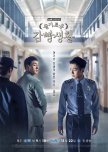Plot:
Prison Playbook‘s plot is primarily driven by its characters, focusing on their internal strifes to propel the drama forward. These serve as intriguingly damning social commentary on two overarching themes: a flawed justice system that unjustifiably ends up punishing the innocent and political corruption. Many other K-dramas that aim to uncover these just end up getting bogged down by convoluted side-plots, but Prison Playbook suffers from none of that. Most of the various major storyline threads flow organically into each other, interspersed with side-splitting dark comedy and remarkably engaging tension.
Characters :
For me, the characters in the story were unique, and each character has a special feature and a story in drama .. For me, all the characters complement each other in an amazing way. If you deleted one of the characters in prison, the story would be incomplete ..
Performance:
Any story would suffer from a poor lead but Prison Playbook had no such issues — Park Hae-soo was perfect for the role. Kim Jehyuk was his first role as a lead actor but he was able to pull off a suitably nuanced performance as the wide-eyed fallen hero. This was a role that needed someone who was not only likable but could also believably handle the ever-shifting power dynamics in prison. Park Hae-soo easily ticked off those checkboxes. Furthermore, he was able to establish an incredible onscreen rapport with every character with whom his character formed an alliance. The result is a drama that made me emotionally invested in everyone who was on his side, even the ones who had once committed terrible, hard-to-forgive crimes.
Music :
The music that accompanied Prison Playbook isn’t likely to be the sort that sticks with you but neither is it all that distracting. Instead, it’s sort of a happy in-between. Suitably tense instrumental music helped enhance the drama’s narrative progression but none of it truly stood out. Its OST album featured major figures such as Heize, Zion.T, Eric Nam, as well as Winner’s Mino but they were mostly just there.
Cinematography :
One would expect a drama about prison life to be underlined by completely muted colour palettes but Prison Playbook seemed quite determined to challenge every expectation. Although the prison walls themselves were as dreary as it gets, Prison Playbook‘s cinematography was subtly underlined by crisp pops of colour that were made possible by props within each mise-en-scène. Consider the scenes shot within Jehyuk’s shared prison cell after he was transferred. The inmates have been there for so long that they’ve practically made some semblance of home for themselves by adding brightly coloured storage spaces, books, and other knick-knacks. This stands parallel to the almost overwhelmingly bright colour palettes outside prison walls as if these items were needed to keep the inmates hold onto any shred of hope or signs of humanity. It’s details like this that make this such an outstanding drama.
It was a great drama and I regret being late to watch it, but it is better than not watching it so happy that I followed it ^ ^ And if I am hesitant then watch it and you will not regret ..
Finally, I hope my review helps you
Prison Playbook‘s plot is primarily driven by its characters, focusing on their internal strifes to propel the drama forward. These serve as intriguingly damning social commentary on two overarching themes: a flawed justice system that unjustifiably ends up punishing the innocent and political corruption. Many other K-dramas that aim to uncover these just end up getting bogged down by convoluted side-plots, but Prison Playbook suffers from none of that. Most of the various major storyline threads flow organically into each other, interspersed with side-splitting dark comedy and remarkably engaging tension.
Characters :
For me, the characters in the story were unique, and each character has a special feature and a story in drama .. For me, all the characters complement each other in an amazing way. If you deleted one of the characters in prison, the story would be incomplete ..
Performance:
Any story would suffer from a poor lead but Prison Playbook had no such issues — Park Hae-soo was perfect for the role. Kim Jehyuk was his first role as a lead actor but he was able to pull off a suitably nuanced performance as the wide-eyed fallen hero. This was a role that needed someone who was not only likable but could also believably handle the ever-shifting power dynamics in prison. Park Hae-soo easily ticked off those checkboxes. Furthermore, he was able to establish an incredible onscreen rapport with every character with whom his character formed an alliance. The result is a drama that made me emotionally invested in everyone who was on his side, even the ones who had once committed terrible, hard-to-forgive crimes.
Music :
The music that accompanied Prison Playbook isn’t likely to be the sort that sticks with you but neither is it all that distracting. Instead, it’s sort of a happy in-between. Suitably tense instrumental music helped enhance the drama’s narrative progression but none of it truly stood out. Its OST album featured major figures such as Heize, Zion.T, Eric Nam, as well as Winner’s Mino but they were mostly just there.
Cinematography :
One would expect a drama about prison life to be underlined by completely muted colour palettes but Prison Playbook seemed quite determined to challenge every expectation. Although the prison walls themselves were as dreary as it gets, Prison Playbook‘s cinematography was subtly underlined by crisp pops of colour that were made possible by props within each mise-en-scène. Consider the scenes shot within Jehyuk’s shared prison cell after he was transferred. The inmates have been there for so long that they’ve practically made some semblance of home for themselves by adding brightly coloured storage spaces, books, and other knick-knacks. This stands parallel to the almost overwhelmingly bright colour palettes outside prison walls as if these items were needed to keep the inmates hold onto any shred of hope or signs of humanity. It’s details like this that make this such an outstanding drama.
It was a great drama and I regret being late to watch it, but it is better than not watching it so happy that I followed it ^ ^ And if I am hesitant then watch it and you will not regret ..
Finally, I hope my review helps you
Esta resenha foi útil para você?
























Comentários